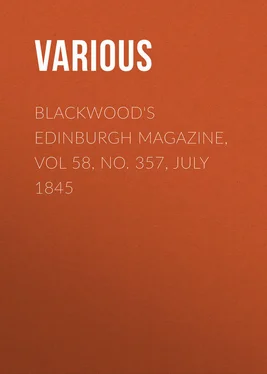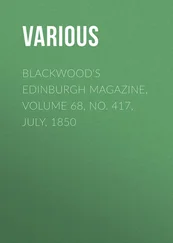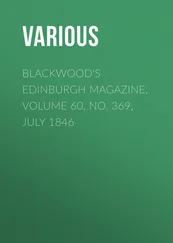Various - Blackwood's Edinburgh Magazine, Vol 58, No. 357, July 1845
Здесь есть возможность читать онлайн «Various - Blackwood's Edinburgh Magazine, Vol 58, No. 357, July 1845» — ознакомительный отрывок электронной книги совершенно бесплатно, а после прочтения отрывка купить полную версию. В некоторых случаях можно слушать аудио, скачать через торрент в формате fb2 и присутствует краткое содержание. Издательство: Иностранный паблик, Жанр: periodic, foreign_edu, Путешествия и география, на английском языке. Описание произведения, (предисловие) а так же отзывы посетителей доступны на портале библиотеки ЛибКат.
- Название:Blackwood's Edinburgh Magazine, Vol 58, No. 357, July 1845
- Автор:
- Издательство:Иностранный паблик
- Жанр:
- Год:неизвестен
- ISBN:нет данных
- Рейтинг книги:3 / 5. Голосов: 1
-
Избранное:Добавить в избранное
- Отзывы:
-
Ваша оценка:
- 60
- 1
- 2
- 3
- 4
- 5
Blackwood's Edinburgh Magazine, Vol 58, No. 357, July 1845: краткое содержание, описание и аннотация
Предлагаем к чтению аннотацию, описание, краткое содержание или предисловие (зависит от того, что написал сам автор книги «Blackwood's Edinburgh Magazine, Vol 58, No. 357, July 1845»). Если вы не нашли необходимую информацию о книге — напишите в комментариях, мы постараемся отыскать её.
Blackwood's Edinburgh Magazine, Vol 58, No. 357, July 1845 — читать онлайн ознакомительный отрывок
Ниже представлен текст книги, разбитый по страницам. Система сохранения места последней прочитанной страницы, позволяет с удобством читать онлайн бесплатно книгу «Blackwood's Edinburgh Magazine, Vol 58, No. 357, July 1845», без необходимости каждый раз заново искать на чём Вы остановились. Поставьте закладку, и сможете в любой момент перейти на страницу, на которой закончили чтение.
Интервал:
Закладка:
Great as these dangers were, however, they had no effect in daunting the heroic spirit of William III. In concert with the Emperor, and the United Provinces, who were too nearly threatened to be backward in falling into his views, he laboured for the formation of a great confederacy, which might prevent the union of the crowns of France and Castile in one family, and prevent, before it was too late, the consolidation of a power which threatened to be so formidable to the liberties of Europe. The death of that intrepid monarch in March 1702, which, had it taken place earlier, might have prevented the formation of the confederacy, as it was, proved no impediment, but rather the reverse. His measures had been so well taken, his resolute spirit had laboured with such effect, that the alliance, offensive and defensive, between the Emperor, England, and Holland, had been already signed. The accession of the Princess Anne, without weakening its bonds, added another power, of no mean importance, to its ranks. Her husband, Prince George of Denmark, brought the forces of that kingdom to aid the common cause. Prussia soon after followed the example. On the other hand, Bavaria, closely connected with the French and Spanish monarchies, both by jealousy of Austria, and the government of the Netherlands, which its Elector held, adhered to France. Thus the forces of Europe were mutually arrayed and divided, much as they afterwards were in the coalition against Napoleon in 1813. It might already be foreseen, that Flanders, the Bavarian plains, Spain, and Lombardy, would, as in the great contest which followed a century after, be the theatre of war. But the forces of France and Spain possessed this advantage, unknown in former wars, but immense in a military point of view, that they were in possession of the whole of the Netherlands, the numerous fortresses of which were alike valuable as a basis of offensive operations, and as affording asylums all but impregnable in cases of disaster. The Allied generals, whether they commenced their operations in Flanders or on the side of Germany, had to begin on the Rhine, and cut their way through the long barrier of fortresses with which the genius of Vauban and Cohorn had encircled the frontiers of the monarchy.
War having been resolved on, the first step was taken by the Emperor, who laid claim to Milan as a fief of the empire, and supported his pretensions by moving an army into Italy under the command of Prince Eugene of Savoy, who afterwards became so celebrated as the brother and worthy rival of Marlborough in arms. The French and Spaniards assembled an army in the Milanese to resist his advance; and the Duke of Mantua having joined the cause, that important city was garrisoned by the French troops. But Prince Eugene erelong obliged them to fall back from the banks of the Adige to the line of the Oglio, on which they made a stand. But though hostilities had thus commenced in Italy, negotiations were still carried on at the Hague; though unhappily the pretensions of the French king were found to be of so exorbitant a character, that an accommodation was impossible. Marlborough's first mission to the Continent, however, after the accession of Anne, was of a diplomatic character; and it was by his unwearied efforts, suavity of manner, and singular talents for negotiation, that the difficulties which attend the formation of all such extensive confederacies were overcome. And it was not till war was declared, on 4th May 1702, that he first took the command as commander-in-chief of the Allied armies.
The first operation of the Allies was an attack on the small fort of Kaiserworth, on the right bank of the Rhine, which belonged to the Elector of Cologne, which surrendered on the 15th May. The main French army, nominally under the direction of the Duke of Burgundy, really of Marshal Boufflers, entered the Duchy of Cleves in the end of the same month, and soon became engaged with the Allied forces, which at first, being inferior in numbers, fell back. Marlborough reached headquarters when the French lay before Nimeguen; and the Dutch trembled for that frontier town. Reinforcements, however, rapidly came in from all quarters to join the Allied army; and Marlborough, finding himself at the head of a gallant force sixty thousand strong, resolved to commence offensive operations. His first operation was the siege of Venloo, which was carried by storm on the 18th September, after various actions in the course of the siege. "My Lord Cutts," says Marlborough, "commanded at one of the breaches; and the English grenadiers had the honour of being the first that entered the fort." 5 5 Despatches , 21st September 1702.
Ruremonde was next besieged; and the Allies, steadily advancing, opened the navigation of the Meuse as far as Maestricht. Stevenswart was taken on the 1st October; and, on the 6th, Ruremonde surrendered. Liege was the next object of attack; and the breaches of the citadel were, by the skilful operations of Cohorn, who commanded the Allied engineers and artillery, declared practicable on the 23d of the same month. The assault was immediately ordered; and "by the extraordinary bravery," says Marlborough, "of the officers and soldiers, the citadel was carried by storm; and, for the honour of her Majesty's subjects, the English were the first that got upon the breach." 6 6 Despatches , 23d October 1702.
So early in this, as in every other war where ignorance and infatuation has not led them into the field, did the native-born valour of the Anglo-Saxon race make itself known! Seven battalions and a half were made prisoners on this occasion; and so disheartened was the enemy by the fall of the citadel, that the castle of the Chartreuse, with its garrison of 1500 men, capitulated a few days afterwards. This last success gave the Allies the entire command of Liege, and concluded this short but glorious campaign, in the course of which they had made themselves masters by main force, in presence of the French army, of four fortified towns, conquered all Spanish Guelderland, opened the Meuse as far as Maestricht, carried the strong castles of Liege by storm, advanced their standards from the Rhine far into Flanders, and become enabled to take up their winter quarters in the enemy's territory, amidst its fertile fields.
The campaign being now concluded, and both parties having gone into winter quarters, Marlborough embarked on the Meuse to return to London, where his presence was much required to steady the authority and direct the cabinet of the Queen, who had so recently taken her seat on the throne. When dropping down the Meuse, in company of the Dutch commissioners, he was made prisoner by a French partisan, who had made an incursion into those parts; and owed his escape to the presence of mind of a servant named Gill, who, unperceived, put into his master's hands an old passport in the name of General Churchill. The Frenchman, intent only on plunder, seized all the plate and valuables in the boat, and made prisoners the small detachment of soldiers who accompanied them; but, ignorant of the inestimable prize within his grasp, allowed the remainder of the party, including Marlborough, to proceed on their way. On this occasion, it may truly be said, the boat carried Cæsar and his fortunes. He arrived in safety at the Hague, where the people, who regarded him as their guardian angel, and had heard of his narrow escape, received him with the most enthusiastic acclamations. From thence, having concerted the plan with the Dutch government for the ensuing campaign, he crossed over to London, where his reception by the Queen and nation was of the most gratifying description. Her Majesty conferred on him the title of Duke of Marlborough and Marquis of Blandford, and sent a message to the House of Commons, suggesting a pension to him of £5000 a-year, secured on the revenue of the post-office; but that House refused to consent to the alienation of so considerable a part of the public revenue. He was amply compensated, however, for this disappointment, by the enthusiastic reception he met with from all classes of the nation, which, long unaccustomed to military success, at least in any cause in which it could sympathize, hailed with transports of joy this first revival of triumph in support of the Protestant faith, and over that power with whom, for centuries, they had maintained so constant a rivalry.
Читать дальшеИнтервал:
Закладка:
Похожие книги на «Blackwood's Edinburgh Magazine, Vol 58, No. 357, July 1845»
Представляем Вашему вниманию похожие книги на «Blackwood's Edinburgh Magazine, Vol 58, No. 357, July 1845» списком для выбора. Мы отобрали схожую по названию и смыслу литературу в надежде предоставить читателям больше вариантов отыскать новые, интересные, ещё непрочитанные произведения.
Обсуждение, отзывы о книге «Blackwood's Edinburgh Magazine, Vol 58, No. 357, July 1845» и просто собственные мнения читателей. Оставьте ваши комментарии, напишите, что Вы думаете о произведении, его смысле или главных героях. Укажите что конкретно понравилось, а что нет, и почему Вы так считаете.












